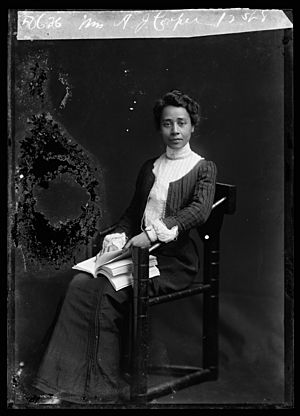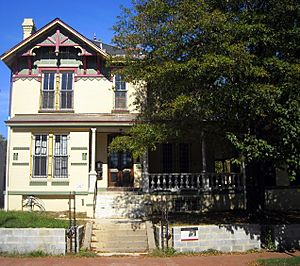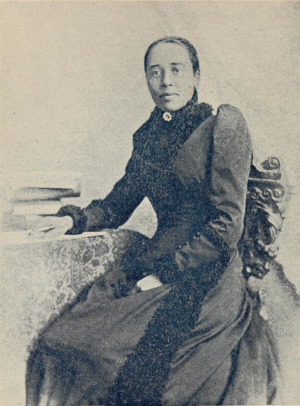Anna J. Cooper facts for kids
Quick facts for kids
Anna J. Cooper
|
|
|---|---|

Cooper c. 1902
|
|
| Born |
Anna Julia Haywood
August 10, 1858 |
| Died | February 27, 1964 (aged 105) Washington, D.C., US
|
| Education | |
| Known for | Fourth African-American woman to receive a PhD |
| Spouse(s) |
George A. C. Cooper
(m. 1877; died 1879) |
| Children | Lula Love Lawson (foster daughter) |
| Relatives | John Haywood (grandfather) |
Anna Julia Haywood Cooper (born August 10, 1858 – died February 27, 1964) was an amazing American author, teacher, and activist. She was also a sociologist and speaker who worked for Black liberation. Many people see her as one of the most important African-American thinkers in US history.
Anna Cooper was born into slavery in 1858. Despite this, she got an excellent education and became a respected leader in academic and social groups. In 1924, she earned her PhD from the Sorbonne, a famous university in Paris, France. This made her the fourth African-American woman to get a doctoral degree. She was also a well-known person in Washington, D.C.'s African-American community and a member of the Alpha Kappa Alpha sorority.
Cooper made big contributions to social studies, especially in sociology. Her first book, A Voice from the South: By a Black Woman of the South, is seen as one of the first books to talk about Black feminism. Because of this, Anna Cooper is often called "the Mother of Black Feminism."
Contents
Biography
Early Life
Anna "Annie" Julia Haywood was born into slavery in Raleigh, North Carolina, in 1858. She and her mother, Hannah Stanley Haywood, were enslaved by George Washington Haywood. Anna had two older brothers, Andrew and Rufus. Andrew later served in the Spanish–American War. Rufus became the leader of a music group called Stanley's Band.
Education and Learning
In 1868, when Anna was nine years old, she got a scholarship to attend the new Saint Augustine's Normal School and Collegiate Institute in Raleigh. This school was started to train teachers for formerly enslaved people and their families. Anna was a very bright and hardworking student. She was good at both liberal arts (like languages and literature) and science and math.
Even though the school had a special "Ladies' Course" for women and didn't encourage them to take advanced classes, Anna fought to take the same challenging courses as the men. She showed everyone how smart she was. During her time at St. Augustine's, she also tutored younger children to help pay for her schooling. One of the young men studying there, George A. C. Cooper, later became her husband. Sadly, he died only two years after they were married.
After her husband passed away, Anna went to Oberlin College in Ohio. She continued to take the same advanced courses as the men and graduated in 1884. She even earned a Master of Arts (M.A.) degree in mathematics from Oberlin in 1888. This made her one of the first two Black women to earn a master's degree, along with Mary Church Terrell. In 1890, she wrote an essay called "Higher Education of Women." In it, she argued that Black women should have access to the best education.
In 1900, Anna Cooper traveled to Europe for the first time. She went to London to attend the First Pan-African Conference. After that, she visited many cities in Scotland, England, Germany, and Italy, including Paris for the World Exposition.
Years in Washington, D.C.
Anna Cooper later moved to Washington, D.C. In 1892, she helped form the Colored Women's League with other important Black women like Ida B. Wells and Mary Church Terrell. This group worked to bring unity and improve the lives of the African-American community.
Anna Cooper taught Latin at M Street High School and became its principal in 1901. She believed in a classical education, which prepared students for higher learning and leadership. This was different from some who favored vocational training (learning job skills).
A Voice from the South
While working as a teacher and principal, Anna Cooper also wrote her first book, A Voice from the South: By a Black Woman of the South, published in 1892. She also gave many speeches asking for civil rights and women's rights.
Her book, A Voice from the South, is considered one of the first important writings about Black feminism. It shared the idea that Black women could achieve self-reliance through education and by improving their communities. The main idea was that if Black women made progress in their education, morals, and spirits, it would help the entire African-American community. Cooper believed that educated women would bring more grace and understanding to education. The essays in her book also discussed topics like race, racism, gender, and the challenges faced by Black families.
Later Life and Achievements

Anna Cooper was a writer, teacher, and public speaker. In 1893, she gave a speech called "The Intellectual Progress of the Colored Women of the United States since the Emancipation Proclamation" at the World's Congress of Representative Women in Chicago. She was one of only five African-American women invited to speak at this big event.
She also attended the first Pan-African Conference in London in 1900 and gave a speech called "The Negro Problem in America."
In 1914, when she was 56 years old, Anna Cooper started working on her doctoral degree at Columbia University. However, she had to pause her studies in 1915 because she adopted her late half-brother's five children after their mother died. Later, she transferred her credits to the University of Paris-Sorbonne. She worked on her dissertation (a long research paper) for over a decade and finished her studies in 1924. She defended her thesis, "The Attitude of France on the Question of Slavery Between 1789 and 1848," in 1925.
At 65, she became the fourth Black woman in American history to earn a Doctor of Philosophy (PhD) degree.
Frelinghuysen University
In 1929, Anna Cooper became the president of Frelinghuysen University. This school was created to offer classes to D.C. residents who didn't have access to higher education. Under her leadership in the 1930s, Frelinghuysen University focused on helping African-American working-class people learn to read and write. It also provided liberal arts and job training for unskilled workers.
Anna Cooper believed in a "decolonizing" way of teaching. This meant helping her students question common ideas and prepare them to fight for a better society. She retired as president in 1940 but continued to work for the university as its registrar. She even held classes in her own home.
Death
Anna Cooper passed away on February 27, 1964, in Washington, D.C., at the amazing age of 105. Her memorial service was held at Saint Augustine's College in Raleigh, North Carolina, where her education journey began. She was buried next to her husband in the City Cemetery in Raleigh.
Writings and Legacy
Her Writings
Anna Cooper's writings include her short autobiography The Third Step, which was about earning her doctorate from the Sorbonne. She also wrote a memoir about the Grimké Family called "The Early Years in Washington: Reminiscences of Life with the Grimkés."
Lasting Impact
Anna Julia Cooper's words continue to inspire people today. For example, pages 24 and 25 of the 2016 United States passport feature a quote from her:
A nation's greatness is not dependent upon the things it make and uses. [...] America can boast her expanse of territory, her gilded domes, her paving stones of silver dollars; but the question of deepest moment in this nation today is its men and its women, the elevation at which it receives its "vision" into the firmament of eternal truth.
In 2009, the United States Postal Service released a special commemorative stamp in her honor. Also in 2009, a tuition-free private middle school named the Anna Julia Cooper Episcopal School opened in Richmond, Virginia.
Anna Cooper is honored on the liturgical calendar of the Episcopal Church (USA) on February 28. There is also an Anna Julia Cooper Center at Wake Forest University and an Anna Julia Cooper Professor of Women's Studies at Spelman College.
Timeline
- 1858: Born into slavery in Raleigh, North Carolina.
- 1877: Marries George A. C. Cooper.
- 1879: Her husband dies, and Anna becomes a widow at 21 years old.
- 1887: Starts teaching math and Latin at the Preparatory School.
- 1892: Publishes her famous book, "A Voice From The South By a Black Woman of the South".
- 1892: Helps found the Colored Women's League with Helen Appo Cook.
- 1893: Attends the World's Congress of Representative Women and reads a paper about the progress of Black women.
- 1900: Attends the First Pan-African Conference in London and joins its executive committee.
- 1901: Becomes the second Black female principal of M. Street High School.
- 1925: Earns her doctorate from the University of Paris.
- 1929: Becomes the second president of Frelinghuysen University in Washington, D.C.
- 1940: Becomes the registrar of Frelinghuysen University and teaches classes at her home.
- 1964: February 27, Anna J. Cooper dies in Washington D.C. at the age of 105.
See also
 In Spanish: Anna J. Cooper para niños
In Spanish: Anna J. Cooper para niños
- African-American history
- African-American literature
- List of African-American writers
- List of Alpha Kappa Alpha sisters
- List of centenarians
- List of people on stamps of the United States
- List of feminist rhetoricians
Images for kids
 | Kyle Baker |
 | Joseph Yoakum |
 | Laura Wheeler Waring |
 | Henry Ossawa Tanner |



